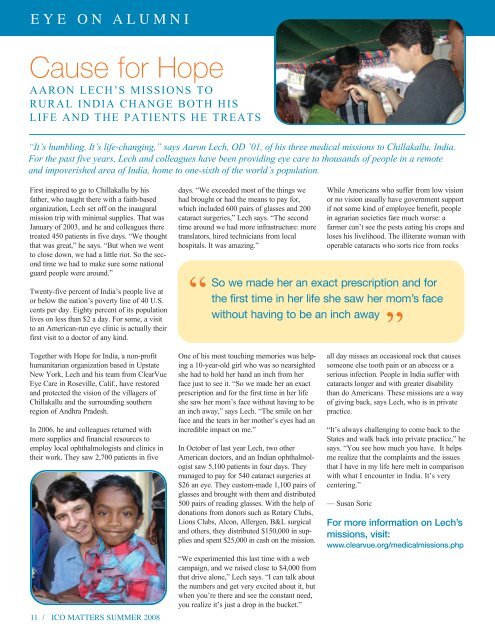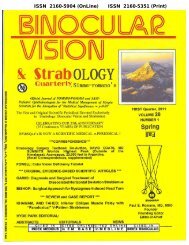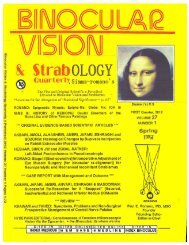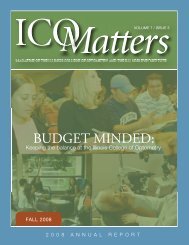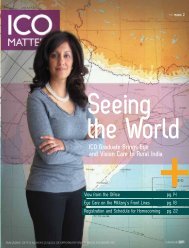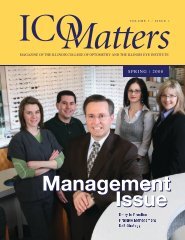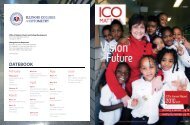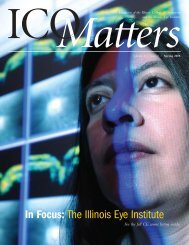Summer 2008 - ICO Worldwide - Illinois College of Optometry
Summer 2008 - ICO Worldwide - Illinois College of Optometry
Summer 2008 - ICO Worldwide - Illinois College of Optometry
You also want an ePaper? Increase the reach of your titles
YUMPU automatically turns print PDFs into web optimized ePapers that Google loves.
E Y E O N A L U M N I<br />
Cause for Hope<br />
AARON LECH’S MISSIONS TO<br />
RURAL INDIA CHANGE BOTH HIS<br />
LIFE AND THE PATIENTS HE TREATS<br />
“It’s humbling. It’s life-changing,” says Aaron Lech, OD ’01, <strong>of</strong> his three medical missions to Chillakallu, India.<br />
For the past five years, Lech and colleagues have been providing eye care to thousands <strong>of</strong> people in a remote<br />
and impoverished area <strong>of</strong> India, home to one-sixth <strong>of</strong> the world’s population.<br />
First inspired to go to Chillakallu by his<br />
father, who taught there with a faith-based<br />
organization, Lech set <strong>of</strong>f on the inaugural<br />
mission trip with minimal supplies. That was<br />
January <strong>of</strong> 2003, and he and colleagues there<br />
treated 450 patients in five days. “We thought<br />
that was great,” he says. “But when we went<br />
to close down, we had a little riot. So the second<br />
time we had to make sure some national<br />
guard people were around.”<br />
Twenty-five percent <strong>of</strong> India’s people live at<br />
or below the nation’s poverty line <strong>of</strong> 40 U.S.<br />
cents per day. Eighty percent <strong>of</strong> its population<br />
lives on less than $2 a day. For some, a visit<br />
to an American-run eye clinic is actually their<br />
first visit to a doctor <strong>of</strong> any kind.<br />
Together with Hope for India, a non-pr<strong>of</strong>it<br />
humanitarian organization based in Upstate<br />
New York, Lech and his team from ClearVue<br />
Eye Care in Roseville, Calif., have restored<br />
and protected the vision <strong>of</strong> the villagers <strong>of</strong><br />
Chillakallu and the surrounding southern<br />
region <strong>of</strong> Andhra Pradesh.<br />
In 2006, he and colleagues returned with<br />
more supplies and financial resources to<br />
employ local ophthalmologists and clinics in<br />
their work. They saw 2,700 patients in five<br />
11 / <strong>ICO</strong> MATTERS SUMMER <strong>2008</strong><br />
days. “We exceeded most <strong>of</strong> the things we<br />
had brought or had the means to pay for,<br />
which included 600 pairs <strong>of</strong> glasses and 200<br />
cataract surgeries,” Lech says. “The second<br />
time around we had more infrastructure: more<br />
translators, hired technicians from local<br />
hospitals. It was amazing.”<br />
“<br />
One <strong>of</strong> his most touching memories was helping<br />
a 10-year-old girl who was so nearsighted<br />
she had to hold her hand an inch from her<br />
face just to see it. “So we made her an exact<br />
prescription and for the first time in her life<br />
she saw her mom’s face without having to be<br />
an inch away,” says Lech. “The smile on her<br />
face and the tears in her mother’s eyes had an<br />
incredible impact on me.”<br />
In October <strong>of</strong> last year Lech, two other<br />
American doctors, and an Indian ophthalmologist<br />
saw 5,100 patients in four days. They<br />
managed to pay for 540 cataract surgeries at<br />
$26 an eye. They custom-made 1,100 pairs <strong>of</strong><br />
glasses and brought with them and distributed<br />
500 pairs <strong>of</strong> reading glasses. With the help <strong>of</strong><br />
donations from donors such as Rotary Clubs,<br />
Lions Clubs, Alcon, Allergen, B&L surgical<br />
and others, they distributed $150,000 in supplies<br />
and spent $25,000 in cash on the mission.<br />
“We experimented this last time with a web<br />
campaign, and we raised close to $4,000 from<br />
that drive alone,” Lech says. “I can talk about<br />
the numbers and get very excited about it, but<br />
when you’re there and see the constant need,<br />
you realize it’s just a drop in the bucket.”<br />
While Americans who suffer from low vision<br />
or no vision usually have government support<br />
if not some kind <strong>of</strong> employee benefit, people<br />
in agrarian societies fare much worse: a<br />
farmer can’t see the pests eating his crops and<br />
loses his livelihood. The illiterate woman with<br />
operable cataracts who sorts rice from rocks<br />
So we made her an exact prescription and for<br />
the first time in her life she saw her mom’s face<br />
without having to be an inch away<br />
all day misses an occasional rock that causes<br />
someone else tooth pain or an abscess or a<br />
serious infection. People in India suffer with<br />
cataracts longer and with greater disability<br />
than do Americans. These missions are a way<br />
<strong>of</strong> giving back, says Lech, who is in private<br />
practice.<br />
“It’s always challenging to come back to the<br />
States and walk back into private practice,” he<br />
says. “You see how much you have. It helps<br />
me realize that the complaints and the issues<br />
that I have in my life here melt in comparison<br />
with what I encounter in India. It’s very<br />
centering.”<br />
— Susan Soric<br />
”<br />
For more information on Lech’s<br />
missions, visit:<br />
www.clearvue.org/medicalmissions.php


